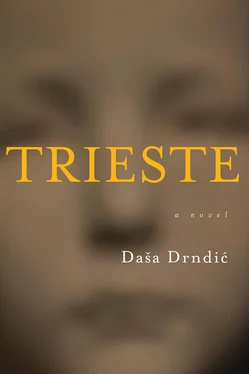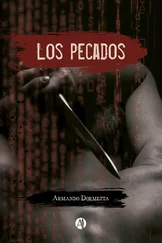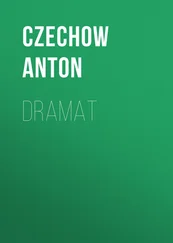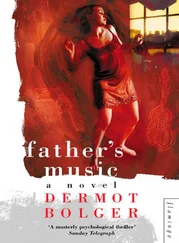Daša Drndić - Trieste
Здесь есть возможность читать онлайн «Daša Drndić - Trieste» весь текст электронной книги совершенно бесплатно (целиком полную версию без сокращений). В некоторых случаях можно слушать аудио, скачать через торрент в формате fb2 и присутствует краткое содержание. Год выпуска: 2014, Издательство: Houghton Mifflin Harcourt, Жанр: Современная проза, на английском языке. Описание произведения, (предисловие) а так же отзывы посетителей доступны на портале библиотеки ЛибКат.
- Название:Trieste
- Автор:
- Издательство:Houghton Mifflin Harcourt
- Жанр:
- Год:2014
- ISBN:нет данных
- Рейтинг книги:3 / 5. Голосов: 1
-
Избранное:Добавить в избранное
- Отзывы:
-
Ваша оценка:
- 60
- 1
- 2
- 3
- 4
- 5
Trieste: краткое содержание, описание и аннотация
Предлагаем к чтению аннотацию, описание, краткое содержание или предисловие (зависит от того, что написал сам автор книги «Trieste»). Если вы не нашли необходимую информацию о книге — напишите в комментариях, мы постараемся отыскать её.
project. Haya reflects on her Catholicized Jewish family’s experiences, dealing unsparingly with the massacre of Italian Jews in the concentration camps of Trieste. Her obsessive search for her son leads her to photographs, maps, and fragments of verse, to testimonies from the Nuremberg trials and interviews with second-generation Jews, and to eyewitness accounts of atrocities that took place on her doorstep. From this broad collage of material and memory arises the staggering chronicle of Nazi occupation in northern Italy.
Written in immensely powerful language and employing a range of astonishing conceptual devices,
is a novel like no other. Daša Drndić has produced a shattering contribution to the literature of twentieth-century history.
Trieste — читать онлайн бесплатно полную книгу (весь текст) целиком
Ниже представлен текст книги, разбитый по страницам. Система сохранения места последней прочитанной страницы, позволяет с удобством читать онлайн бесплатно книгу «Trieste», без необходимости каждый раз заново искать на чём Вы остановились. Поставьте закладку, и сможете в любой момент перейти на страницу, на которой закончили чтение.
Интервал:
Закладка:
Oh keep the Dog far hence, that’s friend to men,
Or with his nails he’ll dig it up again!
I would add something.
Please do, Pound.
See, they return; ah, see the tentative
Movements, and the slow feet,
The trouble in the pace and the uncertain
Wavering!
See, they return, one, and by one,
With fear, as half-awakened;
As if the snow should hesitate
And murmur in the wind,
and half turn back;
These were the “Wing’d-with-Awe”,
Inviolable.
Gods of the wingèd shoe!
With them the silver hounds,
sniffing the trace of air!
You have something against the Pope? Aurelia, who no longer has the golden retriever, asks Haya. People love the Pope, she says.
There is a kind of sausage called Ratzinger, Haya says. Or is it Rottweiler? I’ve forgotten. Birds don’t chirp while they fly, that much is certain; while they fly, birds do not chirp. Ah, Aurelia, Haya says, and then again she says, Ah, Aurelia!
Haya wants to talk, but she cannot. The year is 2006, it is the spring of 2006. In her purse Haya carries a newspaper article from the Corriere della Sera , wrinkled and tattered, stained, creased in several places, which was published on 28 December, 2005, and which for months she has been unfolding and refolding, reading and rereading then reading it again, and by now, of course, she knows it by heart. Haya would like to show this, this article, to Aurelia, who is so fond of the Pope and who is grieving the passing of her retriever. Alfonso Morelli of Bologna says that he found a document in the archives of the French Roman Catholic Church dated October 1946 in which Monsignor Angelo Roncalli, papal nuncio to France and future Pope John XXIII, is ordered to keep track of the fact that the Church must retain supervision and guardianship over Jewish children who were baptized. In this document , Morelli declares, it says that children who have been baptized must under no circumstances be handed over to Jewish agencies with responsibility for the care of children, because these agencies cannot guarantee the further Christian upbringing of these Jewish children, who were saved by the Church during the war and were Catholicized with such benevolence and salvation, especially if these Jewish agencies are handing these, during the war, benevolently Catholicized children back to the Jews, the document says, writes Morelli, and the Jewish agencies can do even less to guarantee anything regarding children Catholicized during the war if the children are given back to their parents, who are searching for them frantically, who pound urgently on the heavy door of the Catholic Church. Further, the document states, Morelli quotes, such children, who have been baptized, should be kept at all costs within the embrace of the Catholic Church, even if their parents are found, even if their parents demand that their children be restored to them. In closing, the document states that this decision, or rather this order, is “confirmed by the Holy Father”, meaning Pope Pius XII, born Pacelli, as Alfonso Morelli from Bologna writes, and Cardinal Angelo Roncalli, future Pope John XXIII, known as “il papa buono”, Morelli writes, had been deeply concerned about the fate of the Jews, because he knew everything about what was going on, because he kept track of what was going on, because he listened to what people told him, among them some Catholic priests as well, and for that reason, Morelli writes, precisely for that reason, after the war Cardinal Roncalli does all he can to reunite the Jewish children, the Jewish children hidden during the Holocaust in Catholic monasteries and various Catholic institutions, to reunite those very children with their parents and their families. The document states that the children who have been baptized, Morelli writes, cannot be handed over to families who will not see to their Christian upbringing. Parents who entrusted their children to the Church, as it also says in the document upon which I stumbled in the archive of the French Catholic Church, quite by accident, since all Catholic Church archives are well guarded and absolutely inaccessible, especially the one in the Vatican called Archivum secretum apostolicum Vaticanum, writes Morelli, those parents who entrusted their children to the Church and are now asking for the return of their children, says the document, which is actually less a document than a directive, writes Morelli, it says “these children” as if they are gifts of God, but they are not, they are someone’s children, writes Morelli, it says these children could only be returned if they were never baptized; if they were baptized, then there is no chance of returning these children to these parents. The directive also stipulates that the Church will consider each case relating to the return of children on its own merits, and issue a final decision, whether to return the child or not, and further, the directive orders that the Church must never under any circumstances respond to official Jewish enquiries in writing. Secrecy and mystery are the underpinnings of the ideology of the Catholic Church, writes Morelli. Since the document which I stumbled upon is a legal Church document written in the spirit of the general principles of the Catholic Church and its policies, and since this document actually forbids the return of children to their legal parents, and as such is approved by the highest Church authority, Pope Pius XII himself, one can assume, writes Morelli, that the order was to be implemented throughout Europe. After this discovery, of course, Morelli continues, the canonization of Pius XII, about which so much has been written and said these past few months, is now in question. My colleagues, journalists and historians, writes Morelli, but also some institutions , he writes, are asking the Vatican to establish a fully autonomous international commission, which they will finance in full, to establish a commission staffed with historians, ecclesiastical officials and forensic experts in order to ascertain how many European children the Church kidnapped. Some estimates posit the number as high as eight thousand. The commission would have to have free access to all Church institutions, writes Morelli, and complete access to all documents. But, writes Morelli, the diaries of Angelo Giuseppe Roncalli, Pope John XXIII, are soon to be published, and it may be possible to learn more regarding this question, the question of the children kidnapped all over Europe. I am appalled at the language in which this document-decree is couched, my friend Leo Levi, president of the Union of Italian Jewish Communities, tells me, writes Morelli, because this document is addressing a serious question, a very painful question, in a manner that is utterly bureaucratic, as Leo Levi tells me, writes Alfonso Morelli. This document makes no mention of the extraordinary historical circumstances under which the Catholicization of Jewish children went on, circumstances in which all these children came under the protection of the Catholic Church, Leo says, Morelli writes. In this directive the Holocaust, which is what led to the baptizing of the Jewish children, in this decree, the Holocaust is never mentioned, Leo Levi says. And furthermore, when the document, or better yet — directive — was written in October 1946, memory of the liberating of Auschwitz was still fresh, Auschwitz had been liberated only a few months before this high-level Church decree was penned, but in it, in this decree, Auschwitz is never mentioned, nor is the Holocaust, Leo Levi says , writes Alfonso Morelli. However , writes Alfonso Morelli in Corriere della Sera on 28 December, 2005, we still don’t know how far Roncalli and other Church functionaries went in implementing the Vatican directive, since all documents pertaining to Church policy are sequestered either in the Vatican archives or in the archives of national churches. It is known, writes Morelli, that at the time of the war many children found shelter in Catholic monasteries, in boarding schools and in schools, but not at the behest of the Pope, writes Morelli. It is well known that after the war the Jews who survived had serious difficulties locating their children, retrieving their children from Catholic institutions , writes Morelli, but until now it was only possible to surmise that the Church was systematically stealing Jewish children in order to indulge Jesus. For sixty years the Church and its “servants” have been striving to prove to the world that they have no blemish on their conscience for their activities as far as World War Two is concerned, writes Morelli. For sixty years the Church has been trying to prove the innocence of Pope Pius XII and many of his bishops and priests. If there is anything that has been preserved with dedication and faith, anything that has been sacrosanct in the church books, then it is the dates of baptisms and deaths, writes Morelli, so it wouldn’t be difficult to ascertain what happened to the baptized Jewish children. If Switzerland, so-called neutral Switzerland, has mustered the strength to set up the Bergier Commission, the I.C.E. — an independent commission of experts — though only on 12 December, 1996, writes Alfonso Morelli, to prove the ties between the Nazi regime and the Swiss banks who had at their disposal vast quantities of stolen Jewish property; if Australia has spoken out about the children kidnapped by their authorities, stolen from Aborigines during World War One, writes Morelli, then instead of obscuring history, the Catholic Church can get off its arse and throw open its archives. And not only that, writes Morelli. It is time for the Church to stop pretending, to stop lying about how its greatest crime during the war was inadequate involvement in saving Jews, writes Morelli, it is time for the Church to stop believing that it is enough for it to launch anaemic apologies for its “inadvertent” lapses, these ecclesiastical apologies, which are becoming more and more revolting over time, truly disgusting, insipid, writes Alfonso Morelli, because, he writes, it is reasonable to deduce that this letter written to Cardinal Roncalli is not the only incriminating document hidden in the vast secret archives of the Catholic Church. We are hopeful it has become clear by now, writes Morelli, that the Church should slow things down a bit as far as the panicked, nearly hysterical race to beatify, canonize, whatever, Pius XII, who, ah, now this is something that is widely known, writes Morelli, was at the head of a Church which was openly championing anti-Semitism at a time when the Nazis and Fascists were persecuting and murdering Jews on a grand scale. He, Pius XII, led a Church in which many German priests abused church birth registers in order to help the Nazis determine who should be first to wear a yellow star — and then be killed, and some German priests kept right on doing this officially for an entire decade after the Holocaust ended, in order to convince those Jews once and for all that they were guilty of murdering Christ. Just as a reminder, writes Morelli, the “Reichskonkordat ”, a concordat signed on 20 July, 1933, between the Holy See and the Reich, is in force in Germany to this day. During that time, Eugenio Cardinal Pacelli, the future Pope Pius XII, is Secretary of the Vatican, and he is the one who signs this concordat, while Cardinal Michael von Faulhaber, writes Morelli, in a sermon given in Munich in 1937, says, “Now, when the leaders of the greatest world nations observe the rise of the new Germany with a dose of reservation and much scepticism, the Catholic Church, this greatest moral force on earth, is showing its trust in the new German authorities through this concordat, which is an act of vast significance, because it contributes to the strengthening of the renown of the new authorities throughout the world,” says Faulhaber, writes Morelli. Abe Foxman tells me, continues Morelli, and Foxman is director of the Anti-Defamation League, writes Morelli, that they placed him, Foxman, with a Polish family and his nanny had him secretly baptized, and later there were terrible problems, all sorts of complications, before he was returned to his parents. I believe that today there are tens of thousands of Jewish children in the world who were saved and then baptized, Abraham Foxman tells me, writes Alfonso Morelli, children who do not know to this day of their origins, nor will they ever learn of them, says Foxman, writes Morelli.
Читать дальшеИнтервал:
Закладка:
Похожие книги на «Trieste»
Представляем Вашему вниманию похожие книги на «Trieste» списком для выбора. Мы отобрали схожую по названию и смыслу литературу в надежде предоставить читателям больше вариантов отыскать новые, интересные, ещё непрочитанные произведения.
Обсуждение, отзывы о книге «Trieste» и просто собственные мнения читателей. Оставьте ваши комментарии, напишите, что Вы думаете о произведении, его смысле или главных героях. Укажите что конкретно понравилось, а что нет, и почему Вы так считаете.












